What did Aristotle think about the Constitution of Carthage?
Aristotle’s views on the Constitution of Carthage, circa 340 BC, are part of his broader analysis of political systems in Politics, a treatise that compares different forms of government. Carthage, a powerful city-state in North Africa, was one of the most significant examples of a mixed constitution combining elements of monarchy, aristocracy, and democracy.
Aristotle’s commentary on Carthage is notable because he generally speaks positively about its political system, viewing it as a well-balanced and stable government. However, he also identifies certain flaws, providing a nuanced assessment of its strengths and weaknesses.
Mixed Constitution and Balance of Power
Carthage had a constitution that Aristotle viewed as a balanced system, incorporating elements of different government types. It combined the rule of kings (monarchy), the leadership of the elite (aristocracy), and the participation of the common people (democracy). This mixed constitution allowed Carthage to avoid the extremes of tyranny, oligarchy, or mob rule that other cities often experienced.
Kingship (Monarchy): Carthage had two magistrates known as suffetes (or judges), who functioned similarly to kings or chief magistrates in other city-states. They held significant executive power, overseeing political and military affairs. However, unlike hereditary monarchies, these suffetes were elected by the people, which Aristotle saw as a positive feature, as it prevented the concentration of power within a single family and allowed for some accountability.
Aristocracy: The Carthaginian elite, primarily composed of wealthy families, played a crucial role in governance. An aristocratic council, which acted as an advisory body, was responsible for guiding the suffetes and handling important state matters. This council ensured that the educated and experienced had a say in the decision-making process, contributing to the stability and longevity of Carthage’s political system.
Democratic Elements: The Carthaginian constitution also allowed for the participation of the common people in certain decisions, particularly when there was a deadlock among the aristocrats or the suffetes. In such cases, the people were called upon to vote, ensuring that the wider population had a voice, albeit limited, in governance. Aristotle approved of this feature because it prevented the elite from monopolizing power, maintaining a degree of equality and fairness in the system.
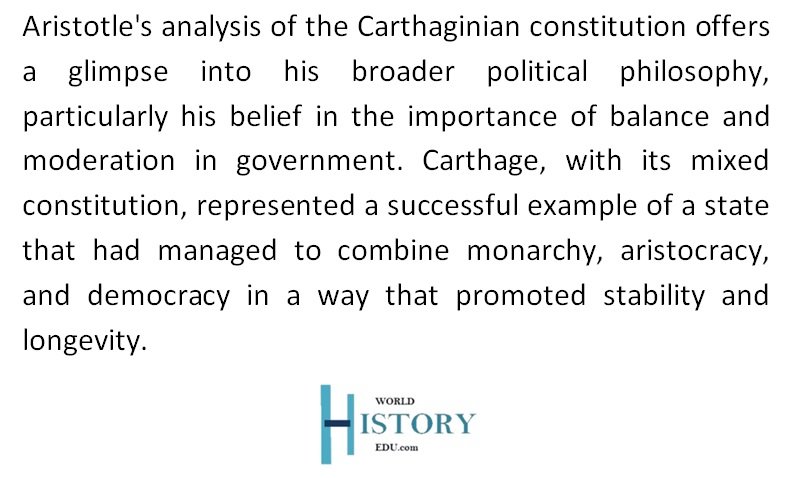
Criticisms of Carthage’s Constitution
Despite Aristotle’s overall positive assessment of the Carthaginian constitution, he identified several areas of concern. His critiques focused on the relationship between wealth and political power, the way offices were distributed, and the potential for instability due to certain institutional practices.
Wealth and Political Power: Aristotle criticized the extent to which wealth played a role in determining political influence in Carthage. While he acknowledged that a degree of wealth is necessary for governance, he believed that the Carthaginians relied too heavily on wealth as a criterion for holding office. This led to the risk of oligarchy, where the rich dominated the political system, potentially leading to corruption or disregard for the needs of the poorer citizens.
The Purchase of Offices: One of Aristotle’s primary concerns was that in Carthage, offices could effectively be bought. Wealthy individuals could attain positions of power by using their resources to gain influence, a practice that Aristotle saw as problematic. He argued that holding office should be based on merit, wisdom, and capability rather than financial status, as the purchase of political positions undermined the integrity of the system and could lead to mismanagement or exploitation.
Overextension of Empire: Aristotle warned that Carthage, like many other states, could face problems due to its imperial ambitions. The Carthaginian Empire was expansive, with colonies and territories spread across the Mediterranean. While empire-building brought wealth and resources, it also required significant military and administrative effort to maintain control over distant territories. Aristotle believed that overextension could lead to instability, as the resources required to sustain the empire might strain the state’s internal cohesion and governance.
Lack of Distinction Between Rich and Poor: Although Carthage allowed the common people to participate in governance under certain conditions, Aristotle believed that the system still favored the wealthy disproportionately. He argued that the constitution did not adequately address the needs of the poorer citizens, which could lead to social unrest or dissatisfaction among the lower classes. In his view, a well-functioning government must strike a balance between the interests of both rich and poor, ensuring that neither group dominates the other.
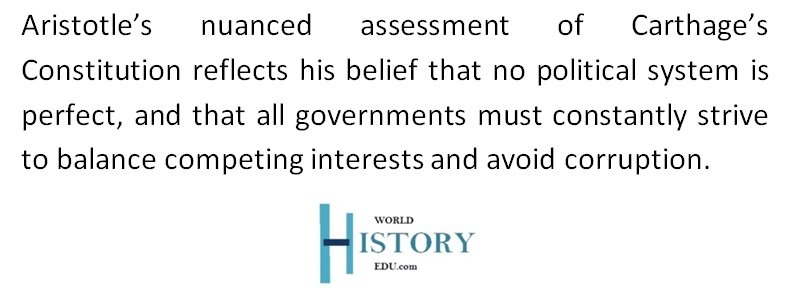
Comparison with Other City-States
Aristotle compared the Carthaginian constitution favorably to those of other city-states, particularly Sparta and Athens, which were well-known for their contrasting political systems. He admired Carthage for avoiding the extremes that plagued these other states.
Sparta: The Spartan constitution was based on a rigid class structure, with the ruling class (the Spartiates) having complete control over the helots (serfs) and other lower classes. While Aristotle admired Sparta’s stability and military prowess, he criticized the harsh treatment of the lower classes and the lack of upward mobility. In contrast, Carthage allowed for some social mobility, as wealthy commoners could attain political office.
Athens: The Athenian democracy was more radical than Carthage’s system, with greater participation of the common people in all aspects of governance. While Aristotle appreciated Athenian democracy’s inclusivity, he believed that it sometimes led to mob rule and poor decision-making due to the lack of guidance from experienced leaders. Carthage’s mixed constitution, with its blend of aristocratic leadership and limited popular participation, struck a better balance, in his view.
Rome: Although Rome was not a major power during Aristotle’s time, its early constitution shared similarities with Carthage’s mixed system. Both states combined elements of monarchy, aristocracy, and democracy, though Rome’s system would later evolve into a more complex republican model. Aristotle’s analysis of Carthage may have influenced later Roman thinkers who sought to understand the benefits of a mixed constitution.
Scipio Africanus: The Roman General who defeated Hannibal of Carthage
Stability and Longevity of Carthage
One of the reasons Aristotle admired Carthage was its long-standing stability. Unlike many Greek city-states, which experienced frequent revolutions and changes in government, Carthage had managed to maintain a relatively stable political system for centuries. Aristotle attributed this stability to the balanced nature of its constitution and the fact that it allowed for peaceful transitions of power.
Carthage’s stability was also due to its adaptability. The Carthaginian government was flexible enough to accommodate changes in leadership and policy without resorting to violent upheaval. This adaptability allowed the city-state to thrive economically and militarily, making it one of the most powerful states in the Mediterranean during Aristotle’s time.
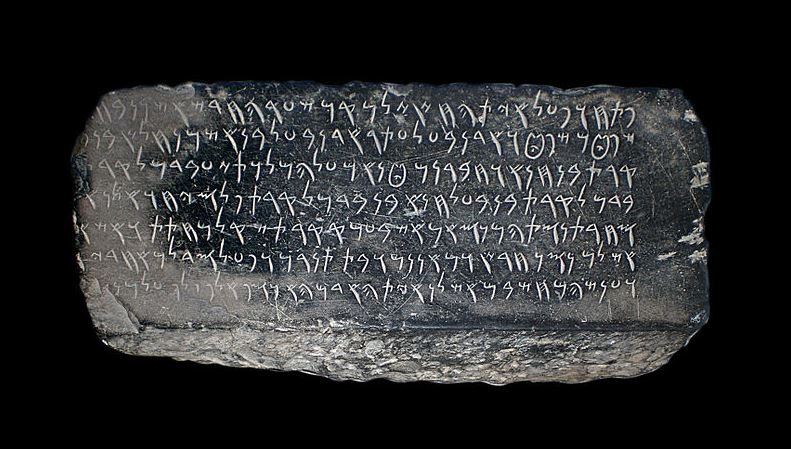
Image: Carthage Administration Inscription, located at the Carthage National Museum in Tunisia.
The Role of Commerce and Wealth
Carthage was a major trading power, and its economy was based on commerce and maritime trade. Aristotle noted that Carthage’s wealth played a crucial role in its political stability, as the state could afford to fund military campaigns, public works, and social programs. However, he also cautioned that an overemphasis on wealth could lead to corruption and moral decay.
Aristotle believed that the pursuit of wealth should be subordinate to the pursuit of virtue and the common good. In Carthage, he saw a potential danger in the growing influence of wealthy merchants and traders who might prioritize their own financial interests over the welfare of the state. Nonetheless, he acknowledged that Carthage had managed to avoid many of the pitfalls that other commercial states had fallen into, largely due to its mixed constitution and the checks and balances within its political system.
The Importance of Education and Civic Virtue
In his analysis of political systems, Aristotle emphasized the importance of education and civic virtue in maintaining a stable government. While he did not provide extensive details about Carthage’s educational system, he implied that the Carthaginian elite were well-educated and trained in the skills necessary for governance.
Aristotle argued that a successful state must cultivate virtue among its citizens, particularly its leaders. He believed that Carthage’s political stability was due in part to the virtue and wisdom of its ruling class, who were able to manage the state’s affairs effectively. However, he also warned that the emphasis on wealth could undermine this virtue, as individuals might seek office for personal gain rather than the common good.
Frequently asked questions about the Carthaginian Government Based on Aristotle’s Analysis
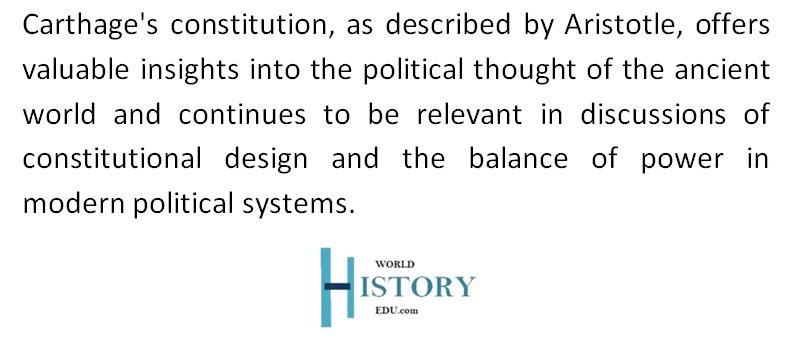
What did Aristotle consider as a key indicator of the effectiveness of the Carthaginian government?
Aristotle viewed the loyalty of the common people to the constitution as a key indicator of Carthage’s effective governance. He noted that Carthage had never experienced a significant rebellion or come under the rule of a tyrant, which demonstrated the state’s long-lasting stability.
In what ways did the Carthaginian constitution resemble Sparta’s system?
The Carthaginian constitution had several similarities to Sparta’s system:
- Carthaginians had communal dining clubs, similar to the Spartan phiditia.
- They had a body of officials called the Hundred-Four, comparable to the Spartan Ephors.
- Both Carthage and Sparta had kings and a council of elders, though Carthaginian kings were selected based on merit rather than seniority or family lineage, which Aristotle considered an improvement over the Spartan system.
How did Carthage’s selection of kings differ from Sparta’s?
Unlike Sparta, where kings came from the same family line, Carthaginian kings were chosen from distinguished families based on merit, not strictly by seniority. This allowed for the best candidates to be selected, preventing unqualified rulers from coming into power, which was a problem in Sparta.

Aristotle argued that prioritizing wealth over virtue leads society to focus on material gain, undermining aristocracy’s moral foundation. Image: Aristotle.
What democratic elements existed in Carthage’s constitution that were different from Sparta and Crete?
In Carthage, if the kings and elders were not unanimous on an issue, the people had the final say. The assembly not only heard proposals but also made decisions, and any citizen could oppose a proposal. This level of public participation and decision-making power was not allowed in Sparta and Crete.
What aspects of the Carthaginian government did Aristotle consider oligarchical?
Aristotle identified several oligarchical traits in Carthage’s government:
- Magistrates of five handled important matters and were co-opted.
- These magistrates selected the supreme council of One Hundred and held office longer than other officials.
- The magistrates were unpaid and not chosen by lot, which concentrated power in their hands and leaned toward oligarchy.
What was Aristotle’s criticism of the Carthaginian system of selecting officials based on wealth?
Aristotle criticized Carthage for giving wealth too much importance in selecting officials. He argued that while wealth could provide the leisure necessary for governance, it was dangerous to make it a key criterion. This practice risked prioritizing financial status over virtue and could lead to a culture of greed where leaders focused on personal gain rather than the common good.
Why did Aristotle believe that emphasizing wealth over virtue in selecting leaders was harmful to the state?
Aristotle argued that when wealth is prioritized over virtue, society becomes focused on material gain, undermining the moral foundation of aristocracy. Leaders who purchase their offices are more likely to use their positions for personal profit, whereas the best rulers should be chosen based on their ability to govern effectively, not their financial resources.
What was Aristotle’s view on one person holding multiple offices in Carthage?
Aristotle criticized the practice of one person holding multiple offices in Carthage. He believed that concentrating too much power in the hands of one individual was inefficient and argued that tasks were best accomplished by specialized leadership, where one person focuses on a single responsibility.
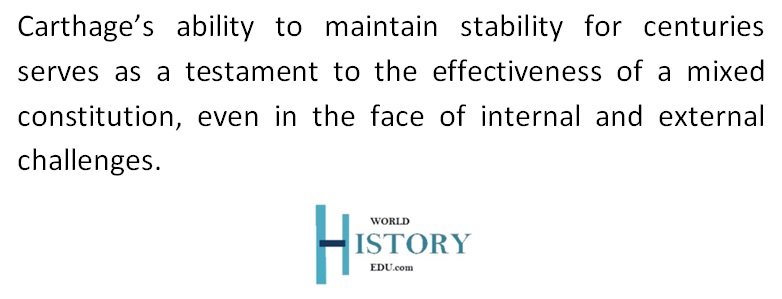
How did Carthage manage to avoid the typical problems associated with oligarchy?
Carthage managed to avoid the usual pitfalls of oligarchy by sending portions of its population to colonies, which distributed wealth and reduced internal conflict. This strategy helped to enrich different segments of the population over time, maintaining stability within the state.
What was Aristotle’s concern about relying on colonization to maintain stability in Carthage?
Aristotle cautioned against relying on colonization as a means of maintaining stability. He argued that a well-designed government should be able to prevent revolution and discontent through its own laws and institutions, rather than depending on external factors like colonization or luck.
How did Aristotle summarize the strengths and weaknesses of the Carthaginian government?
Aristotle admired many aspects of Carthage’s government, particularly its stability and balanced constitution. However, he criticized its oligarchical features, especially the emphasis on wealth in selecting leaders. Despite these flaws, Carthage remained stable for much of its history due to its ability to distribute resources and maintain an effective, though imperfect, political system.



























